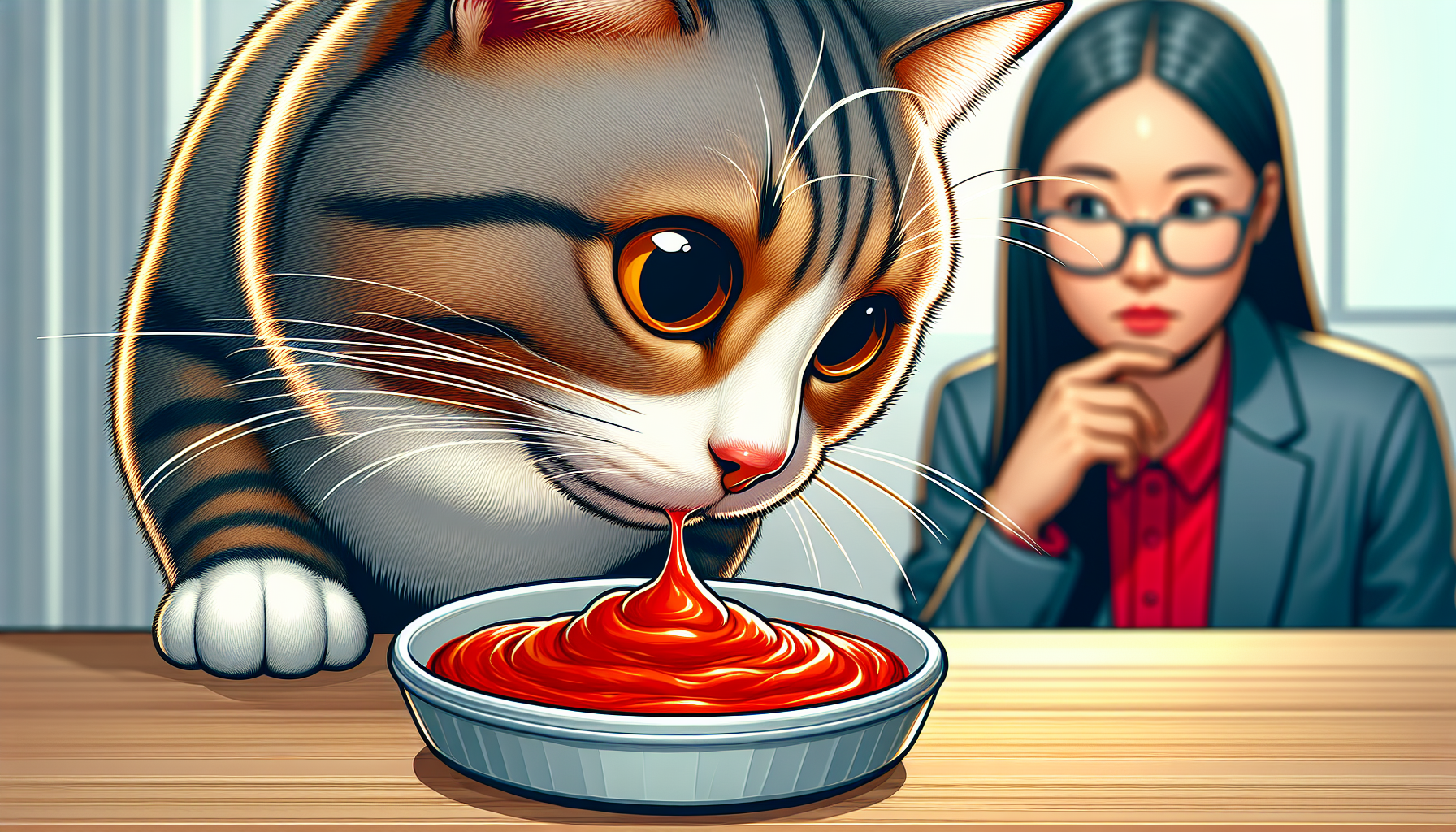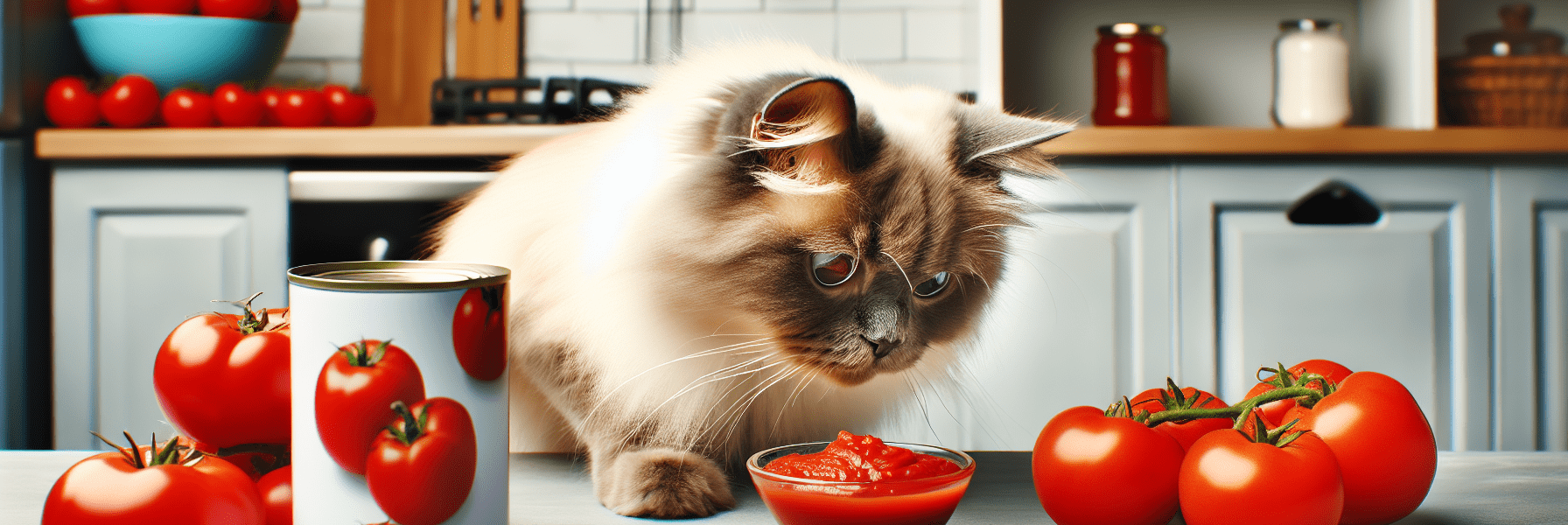Hey there! Have you ever wondered if it’s safe for your furry friend to munch on some tomato sauce? Well, it’s a question that many cat owners have pondered about. In this article, we’ll explore whether or not cats can eat tomato sauce and what potential risks it may pose to their health. So, let’s dig in and find out if this popular condiment is feline-friendly or a big no-no for our whiskered companions.
Can Cats Eat Tomato Sauce

This image is property of images.unsplash.com.
The Impact of Tomato Sauce on Cats
When it comes to the impact of tomato sauce on cats, it is important to consider their unique digestive system. Cats are obligate carnivores, meaning they require a diet primarily consisting of meat. Their bodies are designed to efficiently extract nutrients from animal proteins and fats. Tomato sauce, on the other hand, is a condiment made from tomatoes, which are fruits. This stark difference in dietary composition raises questions about the suitability of tomato sauce for cats.
Nutritional Value of Tomato Sauce
To fully understand the impact of tomato sauce on cats, it is essential to evaluate its nutritional value. Tomato sauce contains macronutrients such as carbohydrates, proteins, and fats. However, the amounts are relatively low and not sufficient to meet a cat’s dietary needs. Additionally, tomato sauce contains micronutrients, including vitamins and minerals, but cats have different nutritional requirements compared to humans. Therefore, while tomato sauce may offer some nutritional value, it is not an ideal source of nutrients for cats.
Risks and Potential Dangers of Tomato Sauce for Cats
While tomato sauce may not provide cats with significant nutritional benefits, it does pose certain risks and potential dangers. It is important for cat owners to be aware of these factors to ensure the well-being of their feline companions.
High Sodium Content
One of the primary concerns with tomato sauce is its high sodium content. Cats have a lower tolerance for salt compared to humans, and excessive sodium intake can lead to various health problems, including hypertension and kidney issues. Consuming tomato sauce, which often contains added salt, can significantly increase a cat’s sodium intake and put their health at risk.
Acidity and Digestive Issues
Tomato sauce is acidic in nature, which can potentially irritate a cat’s sensitive digestive system. Cats may experience digestive issues such as upset stomach, diarrhea, or vomiting after consuming tomato sauce. The acidic nature of tomato sauce can disrupt the natural pH balance in a cat’s stomach, leading to discomfort and gastrointestinal distress.
Possible Allergic Reactions
Just like humans, cats can develop allergies to certain foods. Tomato sauce contains various ingredients, such as tomatoes, herbs, and spices, which may trigger allergic reactions in cats. Symptoms of food allergies in cats can range from mild itching and skin irritation to more severe reactions like difficulty breathing or anaphylaxis. It is crucial to monitor your cat closely for any signs of allergic reactions when introducing tomato sauce.
Garlic and Onion Content
Tomato sauce often contains ingredients like garlic and onions, which are highly toxic to cats. Both garlic and onions belong to the Allium family and contain compounds that can cause damage to a cat’s red blood cells, leading to a condition called hemolytic anemia. Even small amounts of garlic or onion can be harmful to cats, so it is essential to avoid feeding them tomato sauce that contains these ingredients.
Presence of Additives and Preservatives
Many commercially available tomato sauces contain additives and preservatives to enhance flavor and prolong shelf life. These additives can be potentially harmful to cats. Some common additives, such as artificial sweeteners like xylitol or preservatives like BHA and BHT, can have adverse effects on a cat’s health. Cats have a limited ability to metabolize such compounds, which can accumulate in their bodies and lead to long-term health issues.
Alternatives to Tomato Sauce for Cats
Considering the potential risks and dangers of tomato sauce, it is best to explore alternative options that are safe and suitable for cats. Feeding cats a diet that aligns with their natural carnivorous needs is essential for their overall health and well-being.
Suitable Foods for Cats
A well-balanced and nutritionally complete diet for cats should primarily consist of high-quality animal-based proteins. Commercial cat foods, whether wet or dry, provide a convenient and nutritionally balanced option for cat owners. These specialized foods are formulated to meet cats’ specific dietary requirements, ensuring they receive all the essential nutrients in the right proportions.
Homemade Cat-Friendly Sauces
If you prefer to prepare your cat’s meals at home, you can create cat-friendly sauces using ingredients that are safe for feline consumption. Pureed cooked meat, such as chicken or turkey, can be combined with a small amount of low-sodium chicken broth to make a tasty and safe sauce for your cat. It is crucial to avoid using any ingredients that are toxic to cats, such as garlic, onions, or seasoning with spices.
Commercial Cat-Friendly Sauces
For cat owners looking for convenient options, some pet food companies offer specially formulated cat-friendly sauces. These products are designed to provide additional flavor and variety to a cat’s diet without compromising their health. These cat-friendly sauces are often made with high-quality ingredients and do not contain harmful additives, making them a safer alternative to regular tomato sauce.

This image is property of images.unsplash.com.
Introducing Tomato Sauce to Cats
If you still wish to feed your cat tomato sauce, it is essential to introduce it gradually and monitor their response closely. Cats can be sensitive to dietary changes, and it is crucial to take a cautious approach when introducing any new food item.
Gradual Introduction
Start by offering a tiny amount of tomato sauce mixed with your cat’s regular food. Monitor their response for any signs of digestive discomfort or allergic reactions. If they tolerate the small amount without any issues, you can gradually increase the quantity, always being mindful of the potential risks associated with tomato sauce.
Observing Cats’ Reactions
Carefully observe your cat’s behavior and overall health after consuming tomato sauce. Look for any signs of gastrointestinal distress, such as vomiting or diarrhea. If your cat experiences any adverse reactions, discontinue feeding them tomato sauce immediately and consult with your veterinarian.
Consulting a Veterinarian
Before making any significant changes to your cat’s diet, it is always advisable to consult with a veterinarian. They can provide personalized guidance based on your cat’s specific needs and health conditions. A veterinarian can help you assess the safety and appropriateness of feeding tomato sauce to your cat, taking into consideration any individual dietary restrictions or sensitivities.
Tips for Feeding Cats Tomato Sauce Safely
If you decide to feed your cat tomato sauce, it is crucial to take certain precautions to ensure their safety and minimize potential risks. Implementing these tips can help you provide a safer experience for your feline companion.
Moderation is Key
Even if your cat tolerates tomato sauce, it should only be offered in moderation. Tomato sauce should never make up a significant portion of your cat’s diet, as it can lead to imbalances in their nutritional intake. Use tomato sauce sparingly as an occasional treat rather than a staple part of their meals.
Plain and Homemade Tomato Sauce
If you choose to feed your cat tomato sauce, opt for plain varieties without any added seasonings or spices. Homemade tomato sauce made from fresh, ripe tomatoes can be a safer option compared to commercial sauces that often contain ingredients that are harmful to cats. However, it is still vital to avoid adding any toxic ingredients like garlic or onions.
Avoiding Seasonings and Spices
Cats have a more sensitive palate compared to humans, and many seasonings and spices commonly added to tomato sauce can be overwhelming for their taste buds and potentially harmful to their health. Avoid using any spices, herbs, or artificial flavorings that may be present in regular tomato sauce recipes.
Careful Monitoring of Cat’s Health
Regularly monitor your cat’s overall health and well-being when introducing and feeding tomato sauce. Watch for any changes in behavior, appetite, or litter box habits. If you notice any concerning symptoms, it is crucial to consult with a veterinarian, as it may indicate an adverse reaction or underlying health issue.

This image is property of images.unsplash.com.
Signs of Tomato Sauce Intolerance in Cats
Certain cats may have a particular intolerance or sensitivity to tomato sauce. It is essential for cat owners to be aware of the signs of intolerance or adverse reactions so they can take appropriate action promptly.
Gastrointestinal Distress
One of the most common signs of tomato sauce intolerance in cats is gastrointestinal distress. This can manifest as vomiting, diarrhea, stomach upset, or increased gas. If your cat experiences any of these symptoms shortly after consuming tomato sauce, it may indicate intolerance or digestive issues.
Allergic Reactions
In some cases, cats may develop allergic reactions to the ingredients present in tomato sauce. Symptoms of an allergic reaction can include itching, excessive grooming, red or swollen skin, respiratory difficulties, or facial swelling. If you observe any of these signs, stop feeding your cat tomato sauce and seek veterinary assistance.
Lethargy or Loss of Appetite
An adverse reaction to tomato sauce may cause cats to become lethargic or exhibit a loss of appetite. If your cat becomes unusually tired, lacks interest in food, or displays a significant decrease in activity, it is crucial to consult with a veterinarian to determine the cause and appropriate course of action.
Vomiting or Diarrhea
Persistent vomiting or diarrhea after consuming tomato sauce can be indicative of intolerance or a more severe reaction in cats. These symptoms can lead to dehydration and nutrient imbalances, which can be harmful to your cat’s health. If these symptoms occur and persist, immediate veterinary attention is necessary.
Seeking Veterinary Advice
If you have any concerns or questions regarding feeding tomato sauce to your cat, it is always best to seek professional veterinary advice. Veterinarians are highly knowledgeable about feline nutrition and can provide guidance tailored to your cat’s specific needs.
Recognizing Potential Issues
Veterinarians can help you recognize potential issues associated with feeding tomato sauce to your cat. They can assess the risks based on your cat’s individual health status, age, and lifestyle, providing valuable insights to make informed decisions about their diet.
Discussing Cat’s Diet with a Vet
Openly discussing your cat’s diet and potential additions like tomato sauce with a veterinarian helps ensure that you are providing the best possible care for your feline companion. Vets can review your cat’s overall nutritional needs and provide recommendations on suitable alternatives to tomato sauce, as well as any necessary adjustments to their diet.
Seeking Professional Guidance
In cases where your cat has experienced adverse reactions to tomato sauce or has underlying health conditions, it is crucial to seek professional guidance from a veterinarian. They can conduct thorough examinations, perform diagnostic tests if needed, and provide appropriate treatments or dietary modifications as required.

Conclusion
In conclusion, while cats may have a natural curiosity about certain human foods, it is essential to prioritize their health and well-being when deciding what to feed them. Tomato sauce, although not toxic to cats in small amounts, is not a suitable or beneficial addition to their diet. The potential risks and potential allergic reactions associated with tomato sauce should be carefully considered. Always consult with a veterinarian, who can provide expert advice on providing a nutritionally balanced and appropriate diet for your feline companion. Understanding your cat’s individual needs and making informed decisions about their diet will help ensure their long-term health and happiness.

